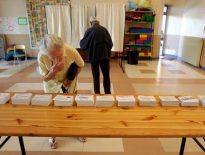(Reuters) – Japan’s securities watchdog flexed its muscles by fining a foreign financial institution for insider trading for the first time, but punishments overall remain modest by global standards, sparking calls for tougher laws to deter a practice that has gone unchecked for years.

Since March, the Securities and Exchange Surveillance Commission (SESC) has sought fines against three investment firms in a total of four cases brought so far in its probe into insider trading ahead of public share offerings, a near endemic problem in Japan.
The latest case, unveiled on Friday, showed a more aggressive side of the SESC. The regulator slapped U.S. broker-dealer First New York Securities with a $185,000 fine, its harshest penalty yet.
But critics say the penalties are still too lax. The first three cases featured very small fines against the asset management firms that traded on inside information and the broker employees that tipped off their clients remained exempt from prosecution under Japanese law.
“We have to consider harsher punishments. The current penalties are way too light,” said Shinsuke Amiya, a lawmaker in the ruling Democratic Party and member of a working group formed to look at strengthening insider trading regulations.
Amiya, a former vice chairman of Merrill Lynch in Japan, said he wants to consider rules that would strip offenders of their operating licenses and the establishment of a new fining system to complement to the modest one already in place.
Under an administrative penalty system introduced in 2005, the SESC levied fines of 50,000 yen ($630) and 80,000 yen in two cases against an asset management unit of Sumitomo Mitsui Trust Holdings, and 130,000 yen in a third against Japanese hedge fund Asuka Asset Management.
The fines were tiny because they were based on the estimated commission from investors in those funds and not on the profit made, sparking criticism that they would do nothing to deter insider trading and could even be counterproductive by showing how small the potential punishment is.
Tougher punishments are possible if the SESC escalates cases to criminal charges, but it does this in only a handful of the most egregious cases each year because it requires a higher burden of proof and coordination with public prosecutors.
Michio Matsui, president of online broker Matsui Securities, said he would like to see the industry’s self-regulating body, the Japan Securities and Dealers Association, fill that gap with severe punishments of its own.
“The fines we’ve seen are missing a few zeros. It’s not until there are penalties severe enough to threaten the health of the firm that you’ll see individuals really weighing the risks of their actions,” Matsui said in a recent interview.
BROADER ISSUE
The penalties in Japan appear all the more restrained in contrast to the high-profile cases regularly brought by regulators in Britain and the United States, where offenders can face multi-million dollar fines and incarceration.
The case against former Goldman Sachs board member Rajat Gupta, who has been charged with securities fraud and conspiracy for allegedly leaking information to a hedge fund manager, is one example of how U.S. authorities will go aggressively after the “tipper” even if he did not trade.
By contrast, not one individual has been subjected to official sanction in Japan. That includes staff at Nomura Holdings, which admitted on Friday that its employees leaked information on three of the four cases brought so far.
Individuals in Japan do face consequences: they may find their career prospects stunted or even lose their jobs if implicated in a probe. And the brokers themselves must confront the risk of sanctions from the Financial Services Agency for poor compliance and the loss of mandates on state-run deals.
Timothy Blakely, a Hong Kong-based partner at Morrison & Foerster LLP and an expert on U.S. insider trading laws, says holding individuals accountable with strict legislation is a key component of an effective regulatory regime.
“And I think for those penalties to be effective they have to develop in a way that run to both the tippee, or the person who is trading, and the tipper as well,” Blakely said.
Japanese authorities have not been sitting on their hands.
Last year, Japan introduced a rule similar to “Regulation M” in the United States preventing investors from covering a short position taken out after the announcement of a share sale with stock in the offering. This move was aimed in part at hedge funds, viewed as among the worst offenders of shorting on leaks and then closing out their position with new offering stock.
The SESC also showed some flexibility in the First New York Securities case by deeming the trader a “primary recipient” of information, thereby making him subject to sanction, even though he was tipped off by a consulting firm employee acting as a conduit and not directly from the Nomura sales staff.
This addressed an important grey area in Japanese law which in principle renders a “secondary recipient” of inside information immune from punishment, a loophole that had been viewed as one obstacle to catching overseas funds.
But Japanese authorities still have a long way to go to bolster the transparency of the financial markets.
Many foreign investors view insider trading as just one part of a larger structural problem with how capital is raised in Japan. For example, the Asian Corporate Governance Association has been urging Japan to shorten its unusually long public-offering period Of up to 15 calendar days to limit the opportunities for speculative funds to distort the process.
“Changes need to be made swiftly to protect shareholders, with recent equity raisings, as well as insider dealings having dented investor confidence,” said Simon Finch, who helps manages a Japan equity fund at Jersey Channel Islands-based Ashburton. ($1 = 79.6150 Japanese yen)
(Additional reporting by Emi Emoto; Editing by Ryan Woo)





